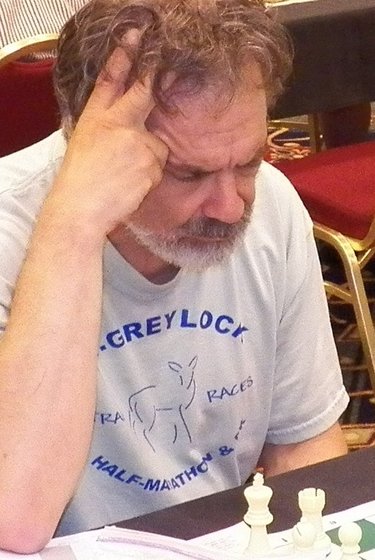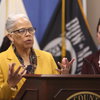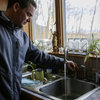Henner wins again, Best Regular Newspaper Chess Column
— Photo by Charles Eson
Peter Henner competes here in the New York State Chess Championship Labor Day weekend. He writes a chess column for The Enterprise and won “Best Regular Newspaper Column” in the annual Chess Journalists of America competition. The not-for-profit organization with about 100 members, including Henner, gives awards for all facets of chess journalism, from print to online.
NEW SCOTLAND — Peter Henner enjoys competition; he likes to win.
A chess player who is dedicating himself to the game, he also writes about chess in a column for The Altamont Enterprise. This year, the Chess Journalists of America named Henner winner in the “Best Regular Newspaper Column” category.
Last year, the first time Henner entered the CJA competition, he was given two honorable mentions.
“I’m honored,” he said at the time. “I hope to win next year.”
And he did. The prize-winning column, published on April 4, was about the 22-year-old Magnus Carlsen, the highest-rated player in history, winning a tournament that allowed him to play a match against the world champion, from India, Viswanathan Anand, 43.
The column opened with a quotation from Rudyard Kipling about how “East is East and West is West and never the twain shall meet” but neither border, nor breed, nor birth matter “when two strong men stand face to face, tho’ they come from the ends of the earth.”
Henner said this week he had hesitated to enter that column since it did not include any game annotations, yet it was one of his favorites.
“It hung together well,” said Henner. “It started off with the Kipling quote, and focused on contrasts — East versus West, young versus old. There was an interesting dynamic. Carlsen was the youngest player in the tournament,” the 2013 Candidates tournament, held in London. “Yet,” Henner went on, “he was tired. It told the story and made the point clear,” Henner said of his column.
The column also included Henner’s opinion that such high-stakes tournaments, with very small margins at best, should not be decided by tie-breaking formulas. “I believe that ties in a case like this should be broken by a playoff match,” wrote Henner.
“And,” Henner concluded of his prize-winning column, “the problem was related to the story.”
Henner ends each of his columns with a chess problem. He likes to make reading an interactive experience. “People pick up a newspaper and look for crossword puzzles or sudokus,” he said. “It gets you involved, instead of passively reading.”
When Henner travels, he enjoys picking up newspapers to read, among other things, the chess columns and to wrestle with the problems. “If it’s really tough,” he said, “you can set up pieces on a chess board to figure it out.”
Henner also enjoys playing chess when he travels. On a trip to Mongolia, he played games of chess on the street. “It’s not just a ritualized combat,” he said earlier. “The appeal is international and at all kinds of levels.”
Henner has also “hung out at chess clubs” in Cuba and Mexico to play impromptu games, and he recently competed in a tournament in Iceland, which he described as “a chess center.”
At age 61, Henner has just given up his practice of law in part to concentrate on chess. “I was, by the standards of the day, a top nationally rated player under 16,” he said, noting that chess players are stronger now than 50 years ago. “My parents were very hostile to my playing chess,” he said, explaining why he didn’t pursue it further as a youth.
Henner turned to playing chess seriously again in law school; coming to Albany in 1980, he said, “I started playing without the ghosts of my adolescent past.”
Henner was then consumed with the demands of his law career, which he wrote about in last week’s Enterprise.
“I always wondered if I could have been a master,” said Henner. Now rated in the Class A range, he plans to devote his intellect and energy to the game with the hopes of becoming a master.
He met another attorney at a tournament, in his mid-forties, who took a year off to devote himself to chess and became a master. Henner called that “a real inspiration.”
He also has hopes to expand his writing about chess to other outlets, and has planned columns for The Enterprise on chess cheaters, playing chess in prison, and on a 9-year-old local chess prodigy.
“Chess is a very logical discipline,” said Henner, explaining why he loves the game. The standing title for his Enterprise column is “Chess: The last frontier of the mind.”
“You have to concentrate, allocate your time, focus, know when to take risks, and when not to take risks,” said Henner. “Because you are in control of an army, it appeals to people who are competitive, logical, able to think things out.”
Unlike other individual, competitive pursuits, like running, which Henner also does, “Chess is intellectual,” he said. “There’s more ego involved. It’s more upsetting when you lose a chess game.”
He said, of playing across cultures or closer to home, “You know what moves mean. It becomes a way of making a social statement. It’s a way of telling what kind of person you are.”



